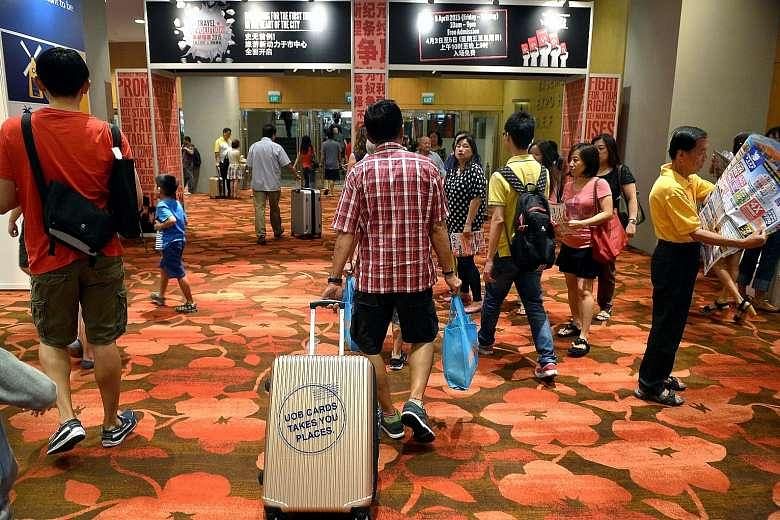SINGAPORE - Errant travel agencies that close down, leaving customers in the lurch, will find it harder to reopen under a different name, after changes to the laws governing the travel industry.
In deciding whether to issue licences to travel agencies, the Singapore Tourism Board (STB) will now consider factors such as whether company directors and other individuals involved with the company "are suitable to hold the license", said Senior Minister of State for Trade and Industry Sim Ann on Tuesday (Nov 7).
Those who have previously contravened travel agent legislation might be denied licences, she added.
This comes as the Travel Agents (Amendment) Bill was passed in Parliament, marking the first update to the industry regulations in a decade.
The changes, which will be implemented in phases from 2018, will beef up consumer protection while relaxing other requirements to foster innovation in the industry.
Among the new rules are enhanced investigation and enforcement powers for the STB, and harsher penalties for malpractices.
The maximum penalty for unlicensed travel agent activities has been raised from $10,000 to $25,000, while the maximum fine for other offences has also been doubled.
Travel agents facing potential suspension or revocation of their licence will also have only 14 days to make their case, down from 21 days. This is aimed at reducing the risk to consumers, as travel agents are still able to collect payments during this period, Ms Sim said.
Those issued a notice of suspension or revocation will be required to disclose this to customers.
Besides imposing stricter requirements on travel agencies, some of the changes also make it easier for travel companies to conduct business.
For instance, a tiered licensing regime will be introduced to lower costs for agencies offering day tours here.
Travel agents offering local tours with dedicated transport, but without accommodation, can obtain a "niche licence" with a minimum requirement of $50,000 in paid-up capital and net worth, half that required for general licences.
Those offering tours that come without such transport, such as bicycle and walking tours, will be exempt from needing a travel agent licence altogether, though tour guide licences will still be required for the guides.
"Such entities pose much lower risk to consumers as prepayment is typically low or not required. We hope that this exemption will encourage more entities to offer consumers innovative and experiential tours, and in turn add to the vibrancy of our tourism landscape," said Ms Sim.
Among the four MPs who spoke in support of the Bill was Mr Lim Biow Chuan (Mountbatten), president of the Consumers Association of Singapore (Case).
Case has received 792 complaints regarding the closure of travel agencies over the past five years, mainly relating to loss of deposits, Mr Lim said.
This can come up to between 20 to 50 per cent of the entire package's costs, he said, adding that some even prepay for the entire package to get "freebies from their credit card companies".
He asked the Government to consider requiring travel agencies to post a performance bond of 20 to 30 per cent of their annual turnover, to provide consumers some protection in the event they close down.
Mr Louis Ng (Nee Soon GRC) also asked about the possibility of establishing a Travel Industry Compensation Fund, financed by registered travel agents, as a last resort option to provide reimbursements to consumers facing situations such as travel agent insolvency.
Ms Sim said in response that such measures would increase business costs across the board for all travel agents, when only a minority of the 1,200 licensed travel agents here are likely to cause harm to consumers.
Instead, travel agents will be required to inform consumers of their option to purchase travel insurance that protects against travel agent insolvency, she said.
Mr Desmond Choo (Tampines GRC) asked about the main reasons for travel agency closures.
Ms Sim said most agencies close down voluntary, and only after fulfilling their contractual obligations. Between 2012 and 2017, there have been 10 sudden closures, making up about 1.5 per cent of all business cessations, she said.
Mr Ng asked how the STB's new powers would safeguard consumers' pre-payments in the event of a tour agency's sudden closure or inability to fulfil its obligations, such as in the case of Misa Travel.
The established travel agency shut down abruptly in May, leaving customers bereft of thousands of dollars in unfulfilled packages.
Ms Sim, noting that the closure of Misa Travel was "not due to malpractices or any ill intent" on agency's part, but to business failure, said the changes in the law are not meant to be "overly intrusive and empower STB to intervene in each and every such case:.
Instead, the purpose is to prescribe regulations to govern the business practices of travel agents in general, she added.
Both Mr Ng and Mr Lim asked about regulations for online platforms offering travel products such as Airbnb Experiences, Tripadvisor and Hotels.com.
Whether an online entity falls within the jurisdiction of Singapore's legislation largely depends on whether it has physical presence in Singapore from which it sells or arranges tours, among other things, said Ms Sim.
An online entity with such a presence will require a travel agent licence, and thus be governed by the laws here, she added.
Mr Steven Ler, acting president of the National Association of Travel Agents Singapore, said the changes will encourage travel agents to be more innovative amid the growing competition.
"The amended legislation will also hold travel agents to higher standards and weed out fly-by-night operators," he added.


